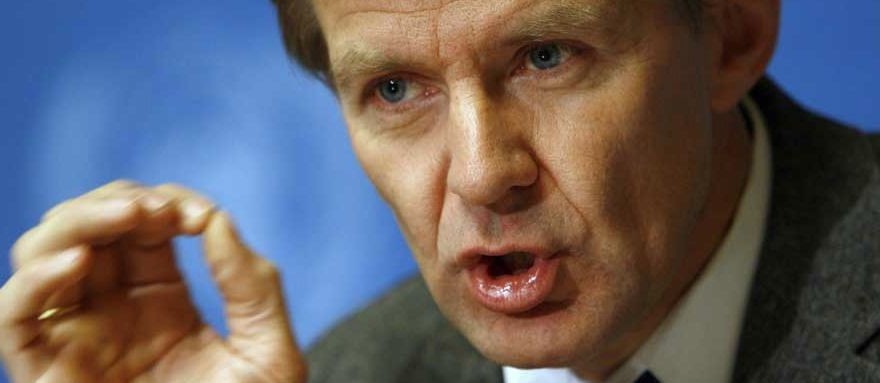Jan Egeland, the former top United Nations aid official, says that without a ‘herculean effort’ to bring in relief supplies over the next two months, millions of South Sudanese potentially will be pushed ‘over the brink’ into hunger or starvation.
“Now the stark image is really a race against time: six, eight, ten weeks before the rainy season. If we do not have enough supplies there when this country becomes impassable by road, a lot of lives will be lost, lives that we can now save if we get there with enough relief supplies in time,” he said.
Egeland served from 2003 to 2006 as Undersecretary-General for Humanitarian Affairs, making him the highest ranked aid official in the UN and head of the Office for the Coordination of Humanitarian Affairs (OCHA).
He was speaking today at a joint news conference in Juba with UN Emergency Relief Coordinator Toby Lanzer. The Norwegian was formerly Lanzer’s boss during his time at the UN, but now serves as head of the Norwegian Refugee Council.
The aid official pointed out that South Sudan does not have enough food “even at the best of times,” suggesting that widespread disruptions to livelihoods such as agriculture and herding would cause mass hunger.
“Secondly, if we’re not able to get these very poor people to plant, the 3.7 million (people who are food insecure) could become even many more millions of people at the brink really, heading towards an abyss,” asserted Egeland.
‘Harrowing stories’
Speaking at the same function, Toby Lanzer, the top UN relief official in South Sudan, referred to the tens of thousands of people sheltering inside UN compounds, emphasizing they “cannot go anywhere else.”
“They don’t feel safe to put one foot outside these compounds,” he said. Lanzer and Egeland today traveled by helicopter from Juba to Minkamen and then Bor before returning.
For his part, Egeland remarked, “Frankly, traveling today, the stories you hear of refugees and displaced are harrowing. A lot of damage is done. But you also meet a lot of aid workers who say ‘we’re willing to rebuild, we’re willing to help,’ and you hear a lot of civilians who say ‘we haven’t lost hope we will rebuild, help us rebuild.’”
“We cannot let the youngest, poorest, most vulnerable nation on earth implode in misery, in blood, in bitterness,” he also said.
Donor countries have also other concerns
But Lanzer pointed out that South Sudan is not the only country in the world where people need humanitarian assistance: “It is going to be very difficult for the donor countries because they have enormous pressures on their budgets at the moment.”
“South Sudan is not the only poor country where there are people suffering. We have enormous needs in Syria, next door in the Central African Republic, so I mean we are ringing the bell for South Sudan because of the scale of the suffering and because of this key issue of time – when the rains come we will find it very difficult to access villages and communities by roads,” he said.
The official elaborated that during the rain season for every dollar a donor would later give for relief, a significant portion of it would be spent actually on logistics and not on actual relief supplies or services.
Photo: Former United Nations Undersecretary-General for Humanitarian Affairs Jan Egeland




